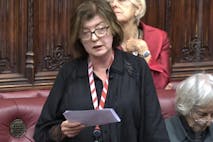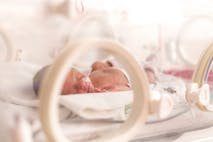
Illinois bishops file amicus brief in opposition of abortion referral mandate
Cassy Cooke
·
NPR publishes unbelievable story of California college student’s struggle to get the abortion pill
NPR is broadcasting the complaints some have made that the ‘free’ abortion pills (chemical abortion) available on college campuses in California are not being advertised adequately to students, leading them to go off campus for abortions. Yet NPR mentions nothing about resources schools should be making available for pregnant and parenting students.
As of January 2023, all of California’s 33 public university campuses are required by law to offer the abortion pill to students. But that’s not enough. Now, they are being pressured to advertise this to students on their websites.
NPR reported that an LAist investigation found that 11 of 23 California State University (CSU) campus clinics didn’t have information about the abortion pill on their websites or list abortion as being available on campus. Two of the University of California’s (UC) 10 campuses also didn’t list the abortion pill on their websites. After the LAist published its findings, five CSU campuses and one UC campus added the abortion pill information to their websites.
In addition to forcing campus health clinics to carry the abortion pill, state legislators set up a $10 million fund to help universities purchase the abortion pills and update their facilities, equipment, training, and security. However, NPR notes, legislators did not require the clinics to advertise that the abortion pill is available on campus at no cost to students.
Connie Leyva, the former state senator who wrote the bill, blamed any pro-life members of campus leadership for the lack of fanfare around the free abortion drugs. “Everything starts at the top. And if the president or chancellor of the university knows they have to offer it, but if they don’t agree that women should have access to abortion services, then they might just think, ‘We’ll leave it off, we don’t have to worry about it,'” she said.

To hit home its argument that colleges should be promoting the abortion pill, NPR included the story of Deanna Gomez, a senior at CSU San Bernardino. Gomez was working 60 hours a week and attending classes when she found out she was pregnant in September. Despite the abortion pill being mandatory and free on campus, she was unaware of its existence there. She didn’t go to the university health clinic, and instead allegedly traveled 300 miles — in the abortion destination state of California —and spent hundreds of dollars to get the abortion pill, which NPR claims she needed because ‘motherhood was not in the plan’ and she ‘grew up poor.’ She allegedly missed a month of classes (NPR doesn’t say why), threatening her on-time graduation.
Article continues below
Dear Reader,
In 2026, Live Action is heading straight where the battle is fiercest: college campuses.
We have a bold initiative to establish 100 Live Action campus chapters within the next year, and your partnership will make it a success!
Your support today will help train and equip young leaders, bring Live Action’s educational content into academic environments, host on-campus events and debates, and empower students to challenge the pro-abortion status quo with truth and compassion.
Invest in pro-life grassroots outreach and cultural formation with your DOUBLED year-end gift!
It’s a story that is hard to believe.
After all, the abortion pill is marketed as easy and quick, and California prides itself on being an abortion destination. In fact, Planned Parenthood has a facility right there in San Bernardino that commits abortions through 21 weeks and six days, including by the abortion pill up to 11 weeks. It is a 15-minute drive or a one-hour bus ride from the school. FPA Women’s Health, also in San Bernardino and about the same distance from the school, commits both in-office surgical abortions and chemical abortions, and its website states that “abortion by mail” is also available.
Gomez didn’t have to travel anywhere, despite NPR’s claims. She also didn’t need an abortion. If she learned she was pregnant in September, she likely had months until she would give birth, pershaps with a post-graduation due date. She could have received assistance from Life Choice Pregnancy Center in San Bernardino, which offers maternity clothes, baby items, baby and toddler clothing, diapers, wipes, health care referrals, pre- and post-natal support, and more resources for women experiencing unplanned pregnancy.
NPR also didn’t note that CSU San Bernardino is required to offer certain services to pregnant and parenting students, including excused absences due to pregnancy and recovery from childbirth; pregnant women must be allowed to make up any missed work. The school also must provide at-home instruction and tutoring if the pregnant or parenting student requests it. NPR didn’t mention if Gomez was made aware of those resources that were available to her and her baby, and certainly didn’t seem to care if she was informed or not. Instead, it seems all NPR and those behind the abortion pill legislation care about is quick and free abortions for certain women — notably, as they mentioned, ‘poor‘ women. But leaving “poor” women to deal with abortion pill complications on their own — passing a potentially recognizable child in a shared dorm bathroom — isn’t compassionate.
Live Action News is pro-life news and commentary from a pro-life perspective.
Contact editor@liveaction.org for questions, corrections, or if you are seeking permission to reprint any Live Action News content.
Guest Articles: To submit a guest article to Live Action News, email editor@liveaction.org with an attached Word document of 800-1000 words. Please also attach any photos relevant to your submission if applicable. If your submission is accepted for publication, you will be notified within three weeks. Guest articles are not compensated (see our Open License Agreement). Thank you for your interest in Live Action News!

Cassy Cooke
·
Guest Column
Right to Life UK
·
Issues
Angeline Tan
·
Issues
Bridget Sielicki
·
Issues
Nancy Flanders
·
Politics
Bridget Sielicki
·
Issues
Nancy Flanders
·
Human Interest
Nancy Flanders
·
Investigative
Nancy Flanders
·
Pop Culture
Nancy Flanders
·
Human Interest
Nancy Flanders
·